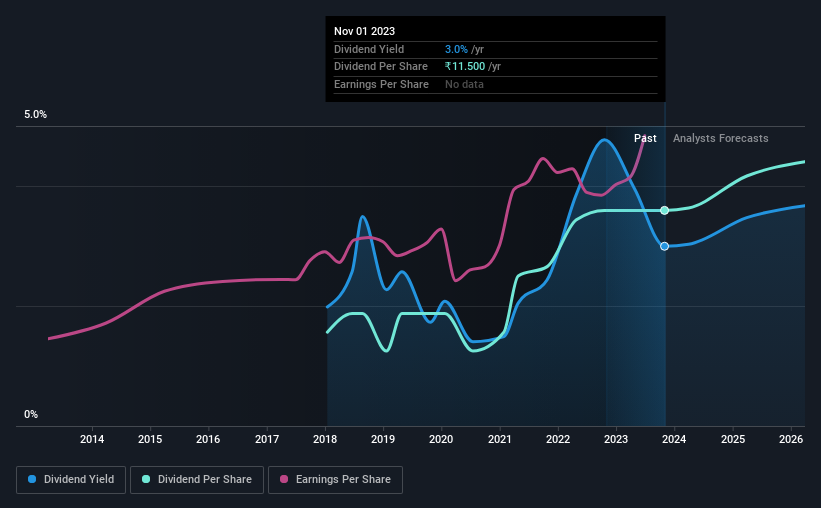- India
- /
- Capital Markets
- /
- NSEI:NAM-INDIA
Nippon Life India Asset Management (NSE:NAM-INDIA) Is Increasing Its Dividend To ₹5.50

Nippon Life India Asset Management Limited (NSE:NAM-INDIA) has announced that it will be increasing its periodic dividend on the 29th of November to ₹5.50, which will be 38% higher than last year's comparable payment amount of ₹4.00. This will take the annual payment to 3.0% of the stock price, which is above what most companies in the industry pay.
See our latest analysis for Nippon Life India Asset Management
Nippon Life India Asset Management's Payment Has Solid Earnings Coverage
While it is great to have a strong dividend yield, we should also consider whether the payment is sustainable. Before making this announcement, the company's dividend was much higher than its earnings. This situation certainly isn't ideal, and could place significant strain on the balance sheet if it continues.
EPS is set to grow by 25.7% over the next year. Assuming the dividend continues along recent trends, our estimates say the payout ratio could reach 86% - on the higher side, but we wouldn't necessarily say this is unsustainable.

Nippon Life India Asset Management's Dividend Has Lacked Consistency
Nippon Life India Asset Management has been paying dividends for a while, but the track record isn't stellar. This suggests that the dividend might not be the most reliable. Since 2017, the dividend has gone from ₹5.00 total annually to ₹11.50. This works out to be a compound annual growth rate (CAGR) of approximately 15% a year over that time. Nippon Life India Asset Management has grown distributions at a rapid rate despite cutting the dividend at least once in the past. Companies that cut once often cut again, so we would be cautious about buying this stock solely for the dividend income.
Nippon Life India Asset Management May Have Challenges Growing The Dividend
Given that the dividend has been cut in the past, we need to check if earnings are growing and if that might lead to stronger dividends in the future. We are encouraged to see that Nippon Life India Asset Management has grown earnings per share at 9.3% per year over the past five years. However, the payout ratio is very high, not leaving much room for growth of the dividend in the future.
The Dividend Could Prove To Be Unreliable
Overall, this is probably not a great income stock, even though the dividend is being raised at the moment. Strong earnings growth means Nippon Life India Asset Management has the potential to be a good dividend stock in the future, despite the current payments being at elevated levels. Overall, we don't think this company has the makings of a good income stock.
Companies possessing a stable dividend policy will likely enjoy greater investor interest than those suffering from a more inconsistent approach. At the same time, there are other factors our readers should be conscious of before pouring capital into a stock. Case in point: We've spotted 2 warning signs for Nippon Life India Asset Management (of which 1 is significant!) you should know about. Is Nippon Life India Asset Management not quite the opportunity you were looking for? Why not check out our selection of top dividend stocks.
Valuation is complex, but we're here to simplify it.
Discover if Nippon Life India Asset Management might be undervalued or overvalued with our detailed analysis, featuring fair value estimates, potential risks, dividends, insider trades, and its financial condition.
Access Free AnalysisHave feedback on this article? Concerned about the content? Get in touch with us directly. Alternatively, email editorial-team (at) simplywallst.com.
This article by Simply Wall St is general in nature. We provide commentary based on historical data and analyst forecasts only using an unbiased methodology and our articles are not intended to be financial advice. It does not constitute a recommendation to buy or sell any stock, and does not take account of your objectives, or your financial situation. We aim to bring you long-term focused analysis driven by fundamental data. Note that our analysis may not factor in the latest price-sensitive company announcements or qualitative material. Simply Wall St has no position in any stocks mentioned.
About NSEI:NAM-INDIA
Nippon Life India Asset Management
Nippon Life Asset Management Limited is a publicly owned investment manager.
Outstanding track record with flawless balance sheet.
Similar Companies
Market Insights
Community Narratives



